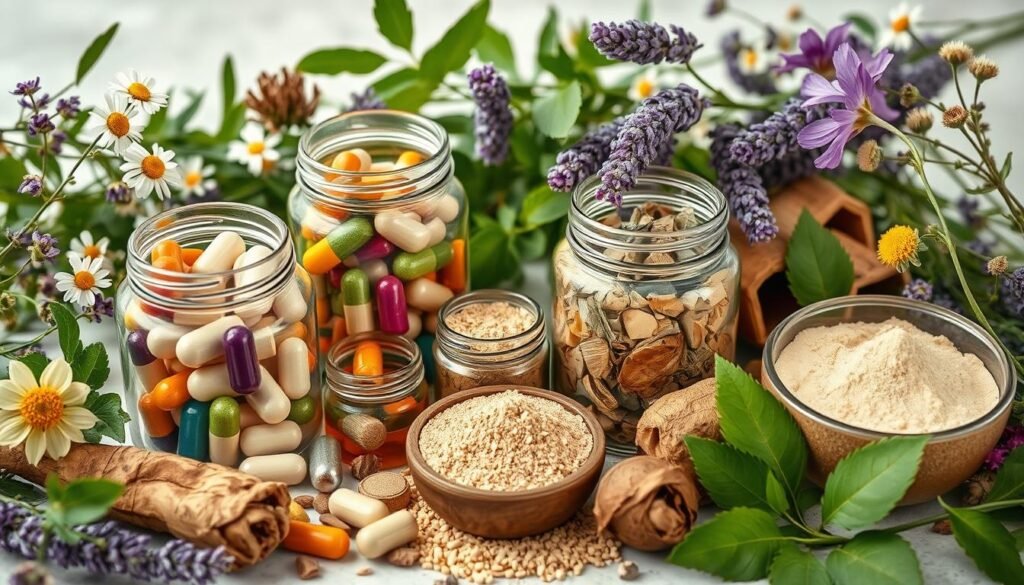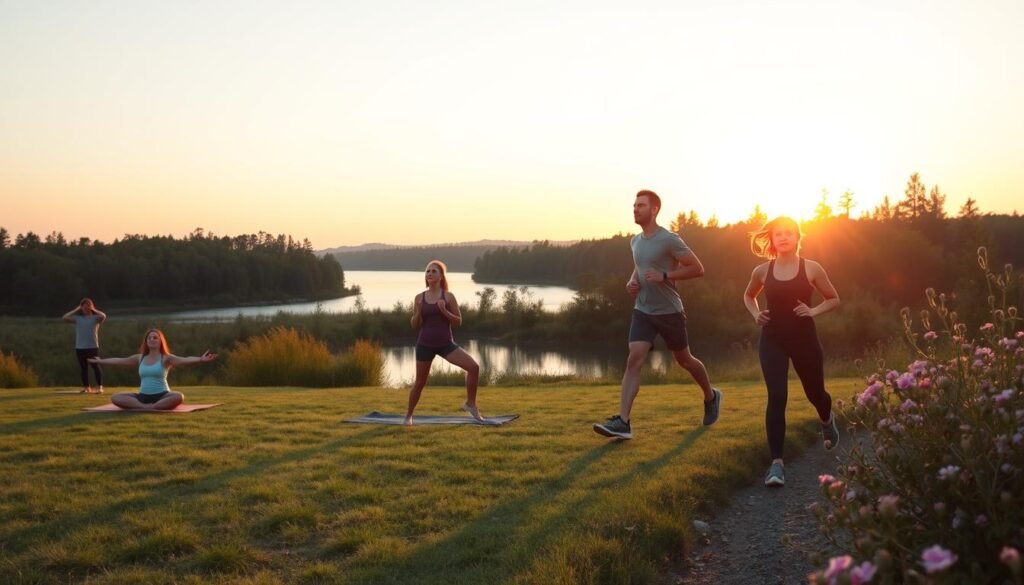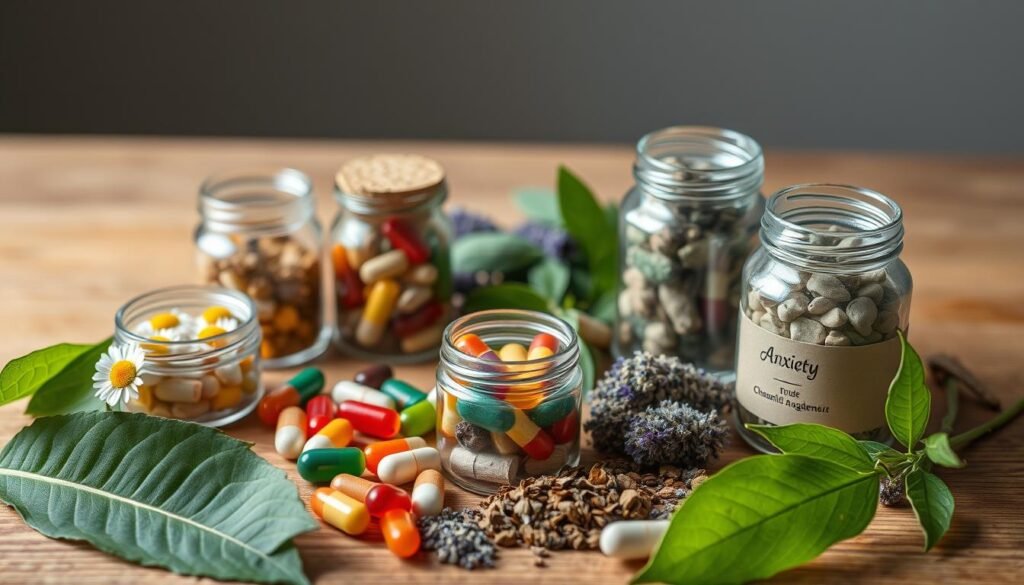Over 19% of U.S. adults face anxiety disorders every year. This shows a big health issue. While therapy and medication are traditional ways, many are now choosing natural anxiety remedies. These remedies include exercises and herbal supplements. They give different ways to handle anxiety every day.
Studies show that working out can lower anxiety symptoms. The more intense the exercise, the better. Journaling, aromatherapy, and spending time with pets also help reduce anxiety. They improve overall happiness. This article will talk about the good things these natural remedies do, their scientific support, and how to use them.
Key Takeaways
- Anxiety disorders impact more than 19% of adults in the U.S. annually.
- Physical exercise is a powerful natural remedy for reducing anxiety symptoms.
- Journaling can enhance coping skills and lower mental distress.
- Aromatherapy, particularly using lavender, may provide significant relief from anxiety.
- Integrating pets into one’s life can offer emotional support and companionship.
- Effective time management can reduce overwhelming commitments and anxiety levels.
Understanding Anxiety and Its Impact
Anxiety is a widespread issue that affects many people around the world. It comes in different types, with some disrupting daily life. Knowing the difference between usual anxiety and anxiety disorders is key. This knowledge helps in handling anxiety better.
Realizing how common anxiety disorders are can improve understanding and support. It makes finding the right help easier.
Defining Anxiety Disorders
Anxiety disorders include several conditions like generalized anxiety disorder and panic disorder. These aren’t just brief worries. They last a long time and might get worse. Studies show about 31% of adults will deal with an anxiety disorder at some point.
This fact stresses the need for effective stress and anxiety solutions. Natural treatments can be crucial for lessening symptoms.
The Difference Between Normal Anxiety and Anxiety Disorders
Regular anxiety is natural and can happen in nerve-wracking situations like speaking publicly. But, anxiety disorders involve ongoing worry, physical stress, and trouble sleeping. People with lasting anxiety should know there are natural ways to get better. These methods can significantly improve life quality.
| Type of Anxiety | Symptoms | Natural Remedies |
|---|---|---|
| Generalized Anxiety Disorder (GAD) | Excessive worry, fatigue, irritability | Chamomile, meditation |
| Panic Disorder | Heart palpitations, sweating, trembling | Magnesium, breathing techniques |
| Social Anxiety Disorder | Fear of social interactions, avoidance | Aromatherapy, yoga |
Benefits of Natural Anxiety Remedies
Natural anxiety remedies boost overall well-being for people with anxiety disorders. They are great tools within anxiety management. These remedies work well with standard medical treatments.
Complementing Conventional Treatments
Adding herbal supplements can offer a full-circle approach to finding relief. Many natural remedies reduce anxiety symptoms and improve mental health. For example, meditation helps bring calmness.
Activities like physical exercise and journaling also lower anxiety, especially in the young. Studies show deep breathing and grounding practices aid emotional stability.
Potential Risks and Considerations
However, there are risks with herbal supplements. They may not mix well with prescribed drugs. Always talk to a doctor before trying new remedies. Avoiding caffeine, tobacco, and alcohol is wise as they can make anxiety worse.

| Natural Remedies | Benefits | Considerations |
|---|---|---|
| Chamomile | Promotes relaxation | Can interact with blood thinners |
| Passion Flower | May reduce anxiety levels | Limited research on long-term effects |
| Lavender | Improves overall mood | Potential skin irritation for some |
| Meditation | Enhances mental clarity and calmness | May require practice to achieve benefits |
| Exercise | Boosts endorphins, reducing stress | Risk of aggravating injury if overdone |
Exercise as a Natural Anxiety Remedy
Exercise acts as a natural anxiety remedy. It brings many mental health benefits. Activities trigger endorphins, aiding in feeling good and reducing anxiety symptoms.
How Physical Activity Helps Reduce Anxiety
Studies show exercise greatly improves mood, similar to medication for some. The U.S. Department of Health and Human Services suggests 150 minutes of moderate or 75 minutes of vigorous activity weekly. These exercises help shift focus from worries, aiding mood stability.
Even small amounts of exercise are beneficial. Activities like walking or chores can ease anxiety. They release endorphins, promoting relaxation and mental health.
Recommended Types of Exercise for Relief
Here are some suggested exercises for anxiety relief:
| Type of Exercise | Description | Benefits |
|---|---|---|
| Aerobic Exercise | Activities like running, cycling, or swimming that increase heart rate. | Improves cardiovascular health, elevates mood, and reduces tension. |
| Yoga | A mind-body practice combining physical postures and breathing techniques. | Enhances mindfulness, reduces stress, and improves flexibility. |
| Strength Training | Weight lifting or bodyweight exercises to build muscle. | Boosts self-esteem and physical ability, contributing to stress relief. |
| Group Sports | Engagement in team activities like basketball or soccer. | Fosters social connections and diversifies exercise experiences. |
Being active regularly helps both physical and mental health. It fights anxiety with natural methods. Whether it’s high-intensity or low-intensity activities, keeping consistent is key for mental wellness.

Herbal Supplements for Anxiety Management
Herbal supplements are growing popular for anxiety control. People often choose them over standard drugs. They prefer natural remedies like chamomile, passion flower, and lavender. Studies show these herbs can ease anxiety with fewer side effects.
Chamomile for Relaxation
Chamomile helps calm the mind. A study with 93 people found it reduces anxiety symptoms. They took 1,500mg daily for 12 weeks, and it helped lower generalized anxiety disorder (GAD) symptoms. Using chamomile regularly may stop anxiety from coming back.
Passion Flower and Its Benefits
Passion flower works as well as standard drugs for anxiety. In one study, 40 people felt less anxious after using it. It doesn’t have the usual side effects like amnesia. This makes passion flower a strong alternative for anxiety relief.
Lavender’s Role in Anxiety Relief
Lavender is known for its anxiety-easing effects. It interacts with the brain to possibly offer quick relief. Also, it helps people feel less anxious before surgery or chemotherapy. This shows how versatile lavender can be for managing anxiety.

However, you should talk to a doctor before trying these herbs. Herbal remedies and medications can interact. Being informed is crucial for safely managing anxiety. For more info on herbal options, check out herbs for anxiety.
Aromatherapy for Holistic Anxiety Relief
Aromatherapy uses essential oils to help calm your mind. By adding it to your daily routine, you might manage anxiety better. There are different ways to use these oils for more benefit.
Essential Oils That Soothe Anxiety
Many essential oils can help with anxiety. The ones listed below are particularly effective:
- Lavender: Lavender oil is calming and can lower stress hormone levels.
- Bergamot Orange: Studies show that bergamot oil can help calm you down before stressful events.
- Roman Chamomile: This oil has been proven to reduce anxiety better than other relaxation methods.
- Clary Sage: Clary sage can decrease your pulse rate, making you feel relaxed.
- Neroli: Neroli oil is good for lessening anxiety and the feeling of pain, especially in tense situations.
- Ylang-Ylang: Although it has a minor direct effect on anxiety, it boosts self-esteem and mood.
Methods of Using Aromatherapy Effectively
There are several ways to enjoy aromatherapy:
- Diffusion: An essential oil diffuser spreads the scent, helping you relax all day.
- Topical Application: Mixing essential oils with a carrier oil for use on your skin can soothe anxiety at pulse points.
- Inhalation: Smelling essential oils directly from the bottle or a cotton ball offers quick relief.
- Baths: Essential oils in bathwater make for a relaxing experience.
Mindfulness Practices for Reducing Anxiety
Mindfulness offers a way to handle anxiety and find peace in everyday life. Techniques such as meditation and focused breathing help pay attention to the now, not worry. Studies show mindfulness can really improve how we feel mentally.
The Power of Meditation in Anxiety Control
Meditation is a powerful tool for fighting anxiety. The Mindfulness-Based Stress Reduction (MBSR) program, made by Jon Kabat-Zinn 40 years ago, helps a lot. A 1992 study found it works well for anxiety and panic.
A 2014 analysis of 47 studies showed meditation lowers anxiety and depression. It looked at over 3,500 people, proving regular meditation is beneficial.
Breathing Techniques for Immediate Relief
Breathing methods offer quick relief for anxiety. They are simple to do anywhere, providing immediate calm. Deep, slow breathing can calm the body’s stress response.
One method is the 4-7-8 technique: breathe in for 4 seconds, hold for 7, exhale for 8. It encourages being mindful and calm.
Using these mindfulness and breathing methods daily can really help with anxiety. It leads to not just less anxiety, but a better life overall.
Natural Anxiety Remedies in Daily Life
Adding natural anxiety solutions to daily routines helps manage stress. It makes for better emotional health. Tasks need organizing, journaling helps, and pets bring joy. These steps focus on practical ways to make every day better.
Time Management Strategies to Alleviate Stress
Good time management can lessen that feeling of being too busy. Split tasks into smaller parts to handle them easier. Setting goals and prioritizing helps with organization. This method is a great natural stress relief.
The Role of Journaling in Anxiety Management
Journaling is a strong way to deal with emotions. It helps clear your mind and reduce anxiety. By tracking daily experiences and concerns, one gains clarity. It’s an effective method for managing anxiety.
Spending Time with Pets for Emotional Support
Research shows pets greatly improve mental health. Being around animals lowers anxiety levels. Playing or snuggling with them brings natural stress relief. It gives a feeling of peace and security.
To sum up, including these habits improves mental health. Finding more natural stress solutions lets people handle their emotions better.
When to Seek Professional Help
Anxiety shows up in many ways. Knowing when to get help is key for better control. For some, anxiety is controlled with lifestyle changes and natural help. But, there are clear signs that you need professional help.
Indicators That Anxiety Needs Medical Attention
Signs you need medical help include:
- Persistent anxiety that messes with daily life.
- Severe physical signs, like panic attacks or fast heartbeats.
- No improvement despite trying to help yourself or using natural remedies.
- Thoughts of hurting yourself or suicidal thoughts.
- Avoiding people or struggling to get through daily routines.
Combining Natural Remedies with Professional Treatments
Mixing natural remedies with professional help can be beneficial. But, it’s important to carefully consider this mix. Managing anxiety well usually means using a range of strategies. Here are some options:
- Cognitive Behavioral Therapy (CBT): Really helps many people, especially with general anxiety or panic attacks.
- Medication: SSRIs and SNRIs are common meds that help ease anxiety symptoms.
- Natural Remedies: Herbal help might bring some relief, but talk to your doctor first.
A common plan might start with therapy to see how bad symptoms are. Then, you might add natural remedies for extra support. Learning more and joining groups like the National Alliance on Mental Illness can also help along your journey.
| Treatment Method | Description | Effectiveness |
|---|---|---|
| Cognitive Behavioral Therapy (CBT) | A therapy type that tackles bad thoughts. | Works for about 75% of people. |
| Medication (SSRIs/SNRIs) | Meds prescribed to help with anxiety. | They work well for most people. |
| Natural Remedies | Herbs and lifestyle changes. | Success varies; more study is needed. |
Talking with a healthcare provider helps create a full plan that fits you, promoting a better handling of anxiety. Getting professional help can greatly improve life for those dealing with anxiety disorders.
Conclusion
About 40 million people in the U.S. face anxiety. Finding effective natural remedies is key. These options offer a full care approach, enhancing standard treatments. Things like working out, using herbs such as lavender and kava, and mindfulness can reduce anxiety signs.
Mindfulness and meditation help a lot with anxiety, studies show. Regular exercise can be as good as antidepressants. Lavender’s calming effects also play a big role without bad side effects. Choosing a plan that fits one’s needs can offer the best benefits.
It’s important to see anxiety as a complex issue. It affects everyday life in many ways. Using natural anxiety solutions with expert advice can help improve mental health. This complete approach can lead to a happier and easier life for those struggling.